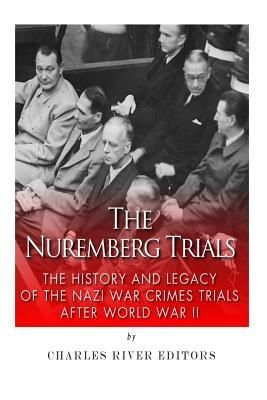*Includes quotes by the defendants, prosecutors, judges, and more
*Includes footnotes and a bibliography for further reading
"There were, I suppose, three possible courses: to let the atrocities which had been committed go unpunished; to put the perpetrators to death or punish them by executive action; or to try them. Which was it to be? Was it possible to let such atrocities go unpunished? Could France, could Russia, could Holland, Belgium, Norway, Czechoslovakia, Poland or Yugoslavia be expected to consent to such a course? ... It will be remembered that after the first world war alleged criminals were handed over to be tried by Germany, and what a farce that was! The majority got off and such sentences as were inflicted were derisory and were soon remitted." - Baron Geoffrey Lawrence, December 1946
At the end of World War II, the world was faced with some sobering statistics. With over 50,000,000 deaths when both military and civilian losses had been accounted for, the death toll was devastating, and for many of those who lived in countries that had been ravaged by war, hunger and financial strain had become parts of daily life. Furthermore, beyond the physical damage was the growing knowledge of the atrocities that had been committed both before and during the war. In fact, the Allies were discussing how to dole out justice for Axis war crimes as early as 1943, and once the war was over, it was time for the nations to turn their attention on the judgment of the German leadership and its role in the death, destruction, and demoralization they had brought to the world. This judgment took place at the most famous trials of the 20th century: the Nuremberg Trials.
The Nuremberg Trials were a series of 13 proceedings held under the authority of the International Military Tribunal between November 1945 and June 1948, but the trial most associated with Nuremberg is the first trial, in which eight judges appointed by Britain, the United States, the Soviet Union, and France deliberated over the guilt or innocence of 22 men identified as significant leaders of the Nazi cause. This trial took place between November 20, 1945 and August 31, 1946. Later trials included other Germans who held what were considered to be position of power- doctors, businessman, or lower-level functionaries whose positions of influence gave them, in the eyes of the Allies, increased responsibility for their actions. Though almost every person convicted in the 13 Nuremberg Trials was male, there was also a female physician convicted at the doctors' trial.
In all, the Nuremberg trials numbered 489 separate hearings, and despite taking place nearly 70 years ago, the impact of the trials can still be felt today. As Harold Marcuse, author and associate professor of history at the University of California, notes, the trials were held for "the most heinous perpetrators of the most despicable crimes, as evidenced by the high proportion of guilty verdicts and the severity of the sentences....a total [over all 13 trials] of 1,672 people were tried and 1,416 found guilty as charged." While some were tried in absentia and never brought to justice, the Nuremberg trials were largely viewed as bringing a sense of closure to the war, and they have been dramatized in numerous movies and documentaries ever since.
The Nuremberg Trials: The History and Legacy of World War II's Famous War Crimes Trials chronicles the history of the trials from their conception to their completion. Along with pictures of important people, places, and events, you will learn about the Nuremberg trials like never before, in no time at all.
